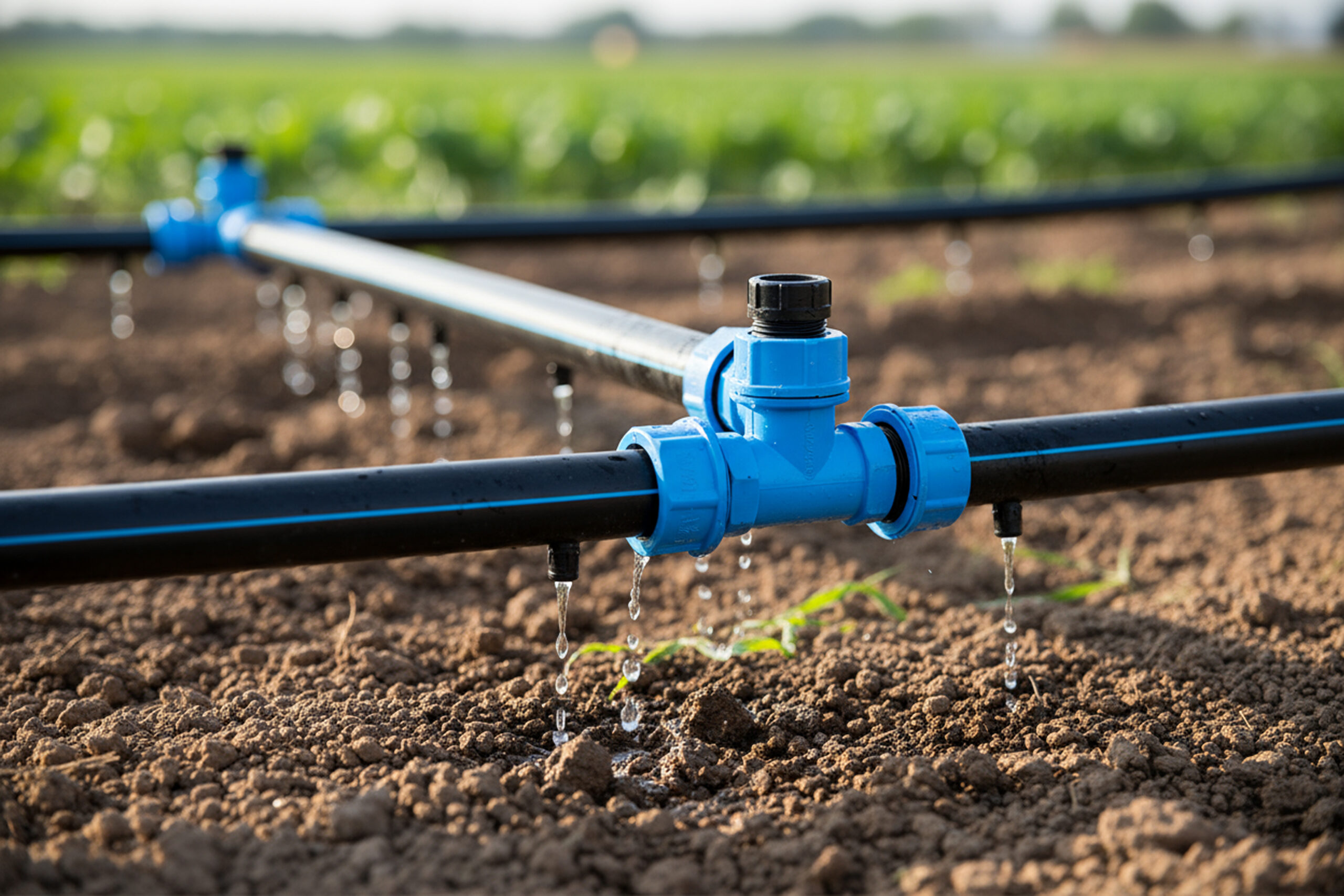Irrigation & Agricultural HDPE Pipe
Tap into the Future with Alexander Tubular.
HDPE Pipe for Agriculture and Irrigation
In Canada, every drop counts. From seals to flexibility across shifting ground, HDPE pipe is the material of choice for modern irrigation solutions.
High-Density Polyethylene Pipe (HDPE) offers engineers a robust and adaptable solution as your operations and crops grow. Flexibility and precise design accommodate ground movements and pressure fluctuations, reducing the risk of leaks and system failures. Custom testing and superior durability ensure you’re set up for a leak-free network, which enhances water conservation and system efficiency throughout an operational lifetime.
HDPE Conformance for Agricultural & Irrigation Applications
Alexander Tubular is proud to manufacture First Nation owned, Canadian made HDPE pipe to the following conformance standards for irrigation & agricultural operations:
- Compliance Standards: ASTM F714/D3035, AWWA C906/C901
- Black with colored striping available; with 2-3% carbon black as per ASTM D3350
- Our material used is listed under the Plastic Pipe Institution (PPI) TR-4 Listing
- Minimum 2-year outdoor storage per ASTM D2513
- Cell Classification 445574A and 445574C as per ASTM D3350
- Hydrostatic Design Basis 1,600 psi @ 73°F (23°C) and 1,000 psi @ 140°F (60°C) as per ASTM D2837
- Pressure Ratings up to 500psi @ 20°C
HDPE Pipe Applications for Agriculture & Irrigation
First Nation, Canada-made HDPE piping is highly versatile, serving various irrigation applications across our diverse agricultural sector. It’s ideal for supplying drip, spray, and micro-irrigation systems across orchards, nurseries, and greenhouses, where precise water delivery is crucial. In large-scale farming, HDPE pipes facilitate efficient water transport over long distances, even in challenging terrain, such as prairies or mountains.
Their durability and flexibility also make them suitable for livestock watering systems, ensuring a consistent and hygienic water supply with minimal maintenance.
Agricultural HDPE Pipe Packing Configurations
Gas Pipe PE4710 HDPE
| Pipe Size | Pipe True Size (OD") | SDR | Weight (LBs) | Packaging | Length | Reels on a Truck (53") | |||||
|---|---|---|---|---|---|---|---|---|---|---|---|
| IPS | in | mm | /Ft | /M | Reel Material | Reel Dia | Meters | Feet | |||
| 3/4" | 1.051 | 26.7 | 1.050 | 11 | 0.126 | 0.412 | Wood | 60" | 1900 | 6234 | 20 |
| 1" | 1.315 | 33.4 | 1.315 | 11 | 0.197 | 0.645 | Wood | 70" | 1200 | 3937 | 18 |
| 1-1/4" | 1.661 | 42.2 | 1.660 | 10 | 0.341 | 1.120 | Wood | 84" | 1000 | 3281 | 14 |
| 1-1/2" | 1.902 | 48.3 | 1.900 | 11 | 0.411 | 1.348 | Wood | 84" | 800 | 2625 | 14 |
| 2" | 2.374 | 60.3 | 2.375 | 11 | 0.642 | 2.107 | Wood | 84" | 600 | 1969 | 14 |
| 3" | 3.500 | 88.9 | 3.500 | 11 | 1.395 | 4.576 | Wood | 112" | 500 | 1640 | 10 |
| 4" | 4.500 | 114.3 | 4.500 | 11 | 2.306 | 7.564 | Wood | 130" | 400 | 1312 | 8 |
Advantages of HDPE Pipe for Agriculture and Irrigation
Leak-Free Performance, Anywhere
HDPE pipes use heat-fusion techniques to create seamless joints, which significantly reduces water loss due to leaks. These reliable joints ensure efficient water delivery and support sustainable irrigation practices across Canada’s diverse and challenging growing conditions.
Superior Durability and Longevity
Alexander Tubular piping products are resistant to corrosion, chemicals, and environmental stressors, including pesticides, herbicides, or livestock medications. HDPE pipes offer a lifespan of over 50 years with minimal maintenance needs and reduced replacement costs over time.
Flexibility and Ease of On-Site Installation
HDPE pipe’s flexibility allows for easy installation around obstacles and in uneven terrains without the need for numerous fittings and stress points. The adaptability of a quality material like HDPE pipe reduces installation time and labour costs, enhancing efficiency in lean operations.These time and cost savings are especially valuable in remote or temporary field setups.

Frequently Asked Questions
Why is HDPE pipe commonly used for irrigation systems?
HDPE pipe is flexible, lightweight, and resistant to corrosion, UV degradation, and agricultural chemicals. Its leak-free fusion joints reduce water loss, making irrigation systems more efficient and cost-effective compared to traditional piping materials.
Can HDPE pipe handle both low-pressure drip irrigation and high-pressure mainlines?
Yes. HDPE is versatile and available in a range of SDR (Standard Dimension Ratio) ratings to meet different pressure requirements. It can be used for low-pressure drip lines, high-pressure pump-fed mains, and even buried or above-ground systems.
How is HDPE pipe installed in irrigation projects?
HDPE is typically supplied in coils or reels, which simplifies transport and reduces the number of joints required. It can be installed by trenching, plowing, or horizontal directional drilling (HDD). Its flexibility allows it to navigate uneven terrain without cracking or breaking.
How does HDPE compare to PVC or metal pipes in irrigation?
HDPE is more impact-resistant and flexible than PVC, making it less likely to crack under pressure or ground movement. Unlike metal pipes, HDPE does not corrode or scale. Its durability, long service life, and reduced maintenance needs make it a cost-effective solution for both large-scale agricultural irrigation and landscape irrigation.
Industrial, commercial,
& municipal expertise
HDPE Pipe for Your Industry
Gas Distribution
Water & Sewer
Industrial & Mining
Oil & Gas
Irrigation
Conduit
Geothermal
Materials for the real world
Precision in Every Pipe
Alexander Tubular manufactures PE100 and PE4710 HDPE pipe to meet top industry standards. With CSA and NSF approved products and operations aligning with ISO 9001:2015, we deliver consistent quality, safety, and reliability.
Associations
Affiliations

“Through the dedication and hard work of many, we have been able to transform the idea into reality and create something that has the promise to be one of Alexander’s most paramount business opportunities for the future.”
Chief George Arcand Jr.
Contact Us.
Your Project, Our HDPE Pipe
Your first step toward enhanced performance, longevity, and cost efficiency begins with contacting us for a personalized quote.
